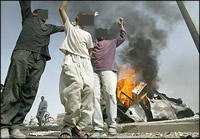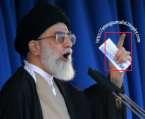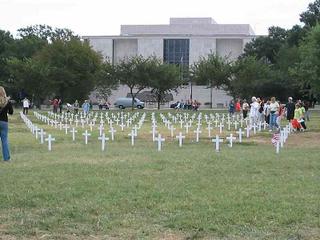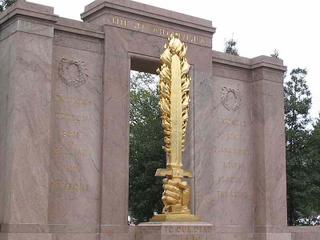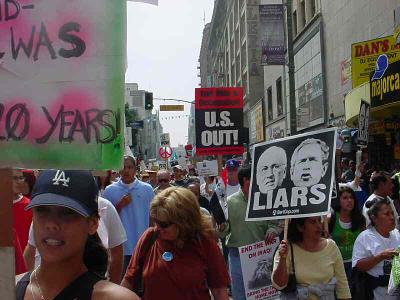
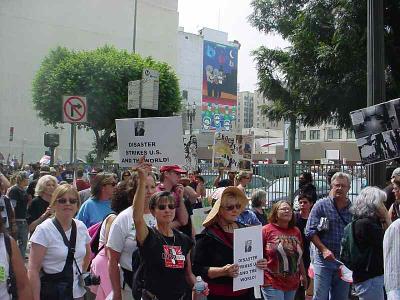

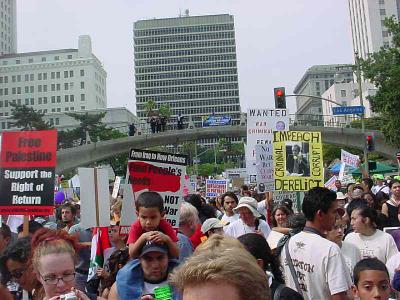

These images are from anti-war protests staged in LA on Sept.24, 2005. The article was written on Aug.31, 2005.
pv vivekanand
The American people are increasingly becoming aware that their government misled them into a disastrous war that has cost at least 1,800 American lives and crippled more than 15,000 soldiers -- not to mention the tens of thousands of Iraqis who have died -- and spent hundreds of billions of dollars and planning to spend more of their tax money for the country's military engagement in Iraq. They have realised that the war has only worsened the potential threats to their personal security. They have realised that their country has lost its standing as the leader of the "free world" in following democratic norms, respecting human rights, and staying away from meddling in the internal affairs of other countries. They have realised that their administration has deprived them of their pride in the founding principles of their country. And they are furious that their government is continuing to maintain the false facade and coming up explanations that no longer make sense to them.
Why is the US in Iraq? This is the question that Americans are raising. The international community has been asking this question for some time, and now Americans are picking it up and posing it to their government.
Was it because Saddam Hussein had weapons of mass destruction, had links with the Sept.11 attacks and posed a threat to the national security of the US?
They know the answers, all of them no.
Was it because Saddam was a brutal dictator who oppressed his people and they needed to be liberated?
Vivid images from Iraq bring home to the Americans the reality that the lot of the Iraqi people is much worse than it was during the reign of Saddam Hussein. They live in perpetual fear, face a critical shortage of basic services, few jobs and have little to look forward to in terms of economic betterment.
Is it because the US wants to bring "democracy" to Iraq?
Not many Americans agree that the US has the right to impose "democracy" on the people of Iraq or any other country. If a situation like that arises, then it is the responsibility of the United Nations to work out an international consensus on what should be done and how it could be done within the parameters of international law and conventions.
Track record
The American track record on democracy under the Bush administration is not exactly the brightest. Bush's victory in the 2000 elections was never accepted as legitimate by a good number of American voters. His re-election in 2004 was even more controversial, with allegations of vote-rigging in several states. This allegation continues to reverberate in cyberspace. Those who are making the charge are asking how could a US president, whose own election remains under a cloud of public rejection, assume a high moral ground and argue for democracy to be imposed on other people.
It has also been reported that Bush was willing to endorse vote-rigging during the Jan.30, 2005 elections in Iraq but for unknown reasons he stopped short of doing so.
Another relevant question is: How could the US president agree to a draft constitution for a country under occupation and force it on its people?
That is what is happening today, critics say. Washington has accepted the demands and impositions of the Shiites and Kurds of Iraq in the draft constitution at the expense of the country's Sunnis whose numbers are as strong as those of the Kurds. And Bush on Tuesday made it clear that he expected the Sunnis to accept the draft.
There goes the democracy argument through the window.
Is the US in Iraq to ensure that the resources of the oil-rich country are used in a way that benefit its people?
Well, the world knows that the only people benefiting from Iraq's oil are the cronies selected by the US and American contractors to whom the interim government in Baghdad is bound under the terms that were dictated by the US when it handed over "sovereignty" on April 28, 2004.
No wonder, Bush is finding it difficult to come up with a coherent answer to the question why the US is in Iraq.
Those asking the questions are also providing the right answers. In summary, they argue that the answers are:
The US invaded and occupied Iraq because of several reasons:
-- It has always been an American objective to gain absolute control over a sizable chunk of the world's oil reserves outside the US. Iraq, with 12 per cent of the world's known reserves of oil and with potential of up to 30 per cent, fits the bill.
-- The idea to invade an Arab country with enough oil resources and occupy it was originally mooted in 1973 -- following the Arab oil embargo -- but shelved because of fears of international opposition to such a move. The plan, first presented by the then secretary of state, Henry Kissinger, following the Arab oil embargo of 1973, was dusted off in the year 2000 and set as a policy objective of the US.
Empire building
The plan for a "global Pax Americana' was drawn up for **** Cheney (now vice- president), Donald Rumsfeld (defence secretary), Paul Wolfowitz, who is now World Bank president, George W Bush's younger brother Jeb and Lewis Libby, who serves as Cheney's chief of staff.
The document, entitled Rebuilding America's Defences: Strategies, Forces And Resources For A New Century, was written in September 2000 by the neo-conservative think-tank Project for the New American Century (PNAC).
It clearly shows that the military action against Iraq was planned even before Bush took office in 2001.
The plan shows the US intended to take military control of the Gulf region whether or not Saddam Hussein was in power.
"The United States has for decades sought to play a more permanent role in Gulf regional security," says the plan. "While the unresolved conflict with Iraq provides the immediate justification, the need for a substantial American force presence in the Gulf transcends the issue of the regime of Saddam Hussein."
The shape of things to come in the region is also spelt out in the plan. It refers to Iran, which is targeted for regime change by the Bush administration -- an objective that Bush promised his neocon supporters before he was re-elected as president last year.
According to the plan "even should Saddam pass from the scene" bases in Saudi Arabia and Kuwait will remain permanently because "Iran may well prove as large a threat to US interests as Iraq has."
-- Saddam, despite having lost his military prowess in the wake of the disastrous war that ended Iraq's seven-month occupation of Kuwait in early 1991, remained a potential threat to the regional hegemony of Israel, the staunchest American ally in the Middle East and which wields immense political influence in the corridors of power in Washington. So he needed to be removed.
The Israeli link to the US action against Iraq is all the more a source of anger for many Americans given revelations that the Jewish state was stealing intelligence information through its spies in key departments like the Pentagon and State Department. Proved connections between some of the key suspects and the neoconservatives have strengthened the conviction of many Americans that the neocons had indeed planned and executed the invasion of Iraq in order to protect and serve Israeli interests more than American interests. The Americans have realised that Israel is the first beneficiary from the war against Iraq.
-- Setting up advanced military bases in the Middle East with enough power to intervene in any country which challenged American interests was key to the neoconservatives' goal of establishing the US as a global empire based on military and political clout. Those bases have to be set up in a country where the regime would be in no position to ask questions. Today, the US is building Iraq as a major military base in the Gulf.
The American military establishment has benefited immensely from the 2001 war against the Taliban and Al Qaeda and the 2003 invasion and subsequent occupation of Iraq.
War spending
The US is said to have already spent more than $300 billion for the Afghan and Iraq wars and is expected to spend more than $700 billion in 10 years. The bulk of the military orders have gone to huge American companies, with a sizable portion of the money channelled to firms with "political connections" in Washington, according to American critics of the Bush administration.
All these purposes were served with the invasion and occupation of Iraq. However, it would be a much more difficult task to force Bush to admit that these were indeed the reasons that he ordered the invasion and occupation of Iraq and these were the direct results of that action.
The US publicly maintains that the size of the American military contingent in Iraq could be scaled back next year if certain goals are realised.
These include: Agreement on an Iraqi constitution by various groups and its endorsement by the interim assembly elected in January this year to be followed by a national referendum and elections for a new government under that charter.
What should be surprising is that the realities on the ground in Iraq are not conducive to the realisation of the American objectives. Complexities are too dense to be sorted out through military means even if the US were to double the number of forces in Iraq.
The divide among the three main sects in Iraq -- Shiites, Kurds and Sunnis -- is yawning with the Kurds and Shiites moving steadily closer to sedition. The Kurds want northern Iraq, including the oil-rich Kirkuk province, for themselves to set up an "independent Kurdistan" while the Shiites want a federal entity for themselves encompassing central and southern Iraq. The Kurdish-Shiite equation leaves the Sunnis, who account for between 15 and 18 per cent of the 25-million population, high and dry, for nothing to show or claim for themselves after being the dominant power in the country under the Saddam regime.
American fury
In a series of speeches this week, Bush declared that to withdraw the US military from Iraq would hurt that country's fledgling democracy and the United States too.
Bush was seeking to shore up support for the war in the face of the anti-war movement spearheaded by led by Cindy Sheehan, a California woman who first met the president after her son's death in Iraq last year and is now pressing for a follow-up meeting. She is also demanding that the US recall its troops from Iraq.
Bush countered by saying on Tuesday: "I think immediate withdrawal from Iraq would be a mistake" and a "policy that would weaken the United States."
As he addressed the press in Idaho, more than 100 anti-war protesters gathered at a park across from the Idaho Statehouse to read the names of the more than 1,800 US soldiers who have died in Iraq and to erect hundreds of tiny crosses in their memory.
"Nothing is going to justify my husband's death," said Melanie House, 27, of Simi Valley, California, whose husband, John House, was killed in a January helicopter crash in Iraq.
"Why are we there? What is President Bush trying to get out of this? Why must my son be fatherless?" she told the crowd, referring to her eight-month-old son.
Laura McCarthy of Eagle, Idaho, whose son, Gavin, 21, is in Iraq, said: "Guess what? (Bush is) going to find a Cindy Sheehan in every community across the US."
That Bush is losing public backing among Americans was shown in the result of a recent opinion poll conducted by American Research Group, which showed that only 36 per cent of respondents approve of their president's performance, down six points since July.
The approval rating registered by Bush this month is the lowest of his tenure in the Group's survey. The president had his best showing in January 2005 with 51 per cent.
On the political front, there are stirrings in the US Congress against the continued military presence in Iraq, but at this point it is more focused on establishing that the Bush administration lied to the legislature into approving military action against that country. Even some among Bush's own Republican party are supporting moves to hold the administration accountable for lying.
Democrats split
The Democrats seem to be split. A recent Washington Post article, titled "Democrats Split Over Position on Iraq War," said:
"Democrats say a long-standing rift in the party over the Iraq war has grown increasingly raw in recent days, as stay-the-course elected leaders who voted for the war three years ago confront rising impatience from activists and strategists who want to challenge President Bush aggressively to withdraw troops."
Celebrated columnist and former presidential candidate Pat Buchanan firmly states that the antiwar movement will continue to grow and it would be an influential factor in the next presidential elections.
He writes:
" The reason Democrats must worry most today is that the antiwar movement taking shape is virulently anti-Bush; it is lodged, by and large, inside their party; it is passionate and intolerant; it has given new life to the Howard Deaniacs who went missing after the Iowa caucuses; and it will turn on any leader who does not voice its convictions....
"This surging antiwar movement will not permit moderates to get away with a stay-the-course, we-support-the-troops position. They will demand a timetable for withdrawal and rally to the candidate who offers one, just as antiwar Democrats rallied to Gene McCarthy, Bobby Kennedy, and George McGovern in 1968 (against the Vietnam war).
"The Democrats' dilemma is hellish. If this war ends successfully, Republicans get the credit. If it ends badly, Bush will be gone, but antiwar Democrats will be blamed for having cut and run, for losing the war, and for the disastrous consequences in the ... Gulf and Arab world."
Gone wrong
Prominent author and commentator Justin Raimundo has ridiculed the administration's acceptance of the Shiite demands in the draft constitution for Iraq and asserted that Washington would not have success in creating a US-friendly regime that country.
Raimundo writes:
"Cindy Sheehan is camped outside George W. Bush's Crawford ranch, demanding to know why her son -- and 1,800-plus other American soldiers, as well as tens of thousands of uncounted Iraqis -- had to die in this bitter war, and the answer is: To install Sharia law in southern Iraq and deliver the country over to parties for whom the Ayatollah Khomeini is a hero."
Raimundo also blasts the US administration for having supported "Kurdish thuggery" in northern Iraq and goes on to say:
"Both the neocon right and the 'centrist' (ie. left-neocon) Democratic Leadership Council denounce the antiwar movement * and any timetable for withdrawal * as 'anti-American.' But how 'pro-American' is the regime we've installed in Iraq by force of arms? When you look at what we've actually done in Iraq * the emerging Islamist-Kurdish tyranny we've empowered * it turns out that the US government is the biggest exponent * and exporter * of true anti-Americanism."
"As Shiite party militias roam the ruins of Iraq's cities killing and beating political dissidents, and whipping women who fail to wear the requisite head-to-toe chador, our "democracy"-crazed neocons cite the country as a "model" * and look forward to the "liberation" of the rest of the Middle East along similar lines," says Raimundo. "The world seen through the prism of neoconservatism is truly a bizarre world, where everything is stood on its head, not just physical laws but also traditional moral precepts as well as the rules of logic.
"Americans are naturally repulsed by the sight of what the Busheviks have wrought in Iraq, but the alternative is not to turn around and make war on the Shiite-Kurdish tyranny we made possible in the first place. A war along those lines would be an act of such incredible hubris that it would make our prior mistakes * beginning with the invasion of Iraq * seem almost benign."
"It's time to face up to the horrific reality: There are places on this earth that in no way resemble the cultural and political landscape of the US, and nothing we do will turn Iraq into a suburb of the American metropolis. Short of wiping out a good portion of the population and imprisoning most of the rest in 're-education' camps where they'll be forced to memorise Robert's Rules of Order and the aphorisms of Emily Post, it simply cannot be done."
However, the Bush administration appears not to have accepted the realities on the ground in Iraq and is determined that the solution to the problem is through continued military presence as affirmed by the top general of the US Army that the military intends to keep the present strength of nearly 140,000 in Iraq for four more years.
Long haul
US General Peter Schoomaker, who said in an interview with the Associated Press that the army was prepared for the "worst case" in terms of the required level of troops in Iraq, spoke in strictly military terms. He did not refer to the politics behind it or the ulterior American objectives.
"We are now into '07-'09 in our planning," Schoomaker said referring to the presence of 138,000 American soldiers in Iraq.
Schoomaker's comments indicated that the US military is in Iraq for the long haul, beyond the term of Bush, which ends in 2007. In military terms, the current rotation of troops for 2005-07 will overlap with the 2006-08 replacements. Beyond that, the army is drawing up the plan for the 2007-09 switch, Schoomaker said.
A close look at the statements made by Bush himself and other senior administration officials since the invasion of Iraq in March 2003 would show that all of them were trying to tell the world that the US military presence in Iraq was a short-term affair and limited to handing over power to an institutionalised political system in the country.
Indeed, it was only recently that Rumsfeld spoke of the possibility of the US presence in Iraq remaining as far ahead as 10 or 12 years. That sounded more realistic, given the almost impossible task the US faces in trying to institutionalise Iraq in a manner that serves American strategic interests in the Middle East.
Bush is perfectly right when he says that withdrawal from Iraq would "weaken" the US as long as it is seen in the context of the neoconservative objective of turning the US into a global empire. Quitting Iraq means removing a key piece from that global picture of the US that the neocons are trying to piece together, and hence ending the American military presence there is not in their agenda, which in turn means "staying the course."
However, the American people are not standing by. The days ahead would see a bitter confrontation between the pro-war and antiwar camps in the US, with the neocons seeking to bulldoze their way through anyone and anything that could cast a cloud on their course. The intense smear campaign levelled against Sheehan is a classical example of how the neocons work.
Given the declarations and affirmations from Bush and other senior administration officials, it is clear that Washington would stay firm against any pressure for withdrawal from Iraq and would continue to take American casualties. As such, the question should shift from "why the US is in Iraq" to "how long would it take for the neocon camp to see the realities as they are and how many American soldiers and Iraqis have to die before they decide Iraq was a misadventure?"

